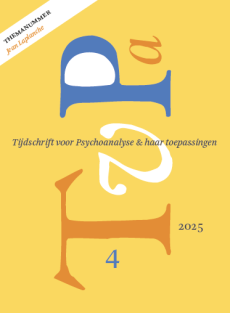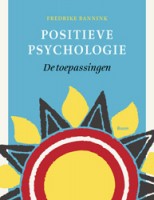Hoe moeders in beeld blijven
Summary
Like many other analysts, Robert Emde emphasizes the importance of the affective climate of the earliest mother-infant bond in constituting the first experience of self and the earliest images of the mother-object. Emdes particular contribution in this field is to be situated in his thorough observation and conceptualization of several biosocial building-blocks and developmental principles that play a crucial part in facilitating a mainly positive-toned relation between the child and his or her carer in the first months of life. The building-blocks he describes are self-regulation, affective monitoring and social referencing; the developmental principles are development of self and others, development of a notion of past and future, development of the idea of causality, and language development before the acquisition of language.
In clinical practice, the earliest affectively toned self-experience and object image leave their traces. Changes are indicative of therapeutic progress.
Literatuur
- Bion, W. (1962). A theory of thinking. International Journal of Psycho-Analysis, 43, 306-310.
- Biringen, Z., Robinson, J.L. & Emde, R.N. (1998). Emotional Availability Scales, 3rd edition. Attachment and human development. Special issue on emotional availability and attachment, 2, 257-270.
- Emde, R.N. (1983). The prerepresentational self and its affective core. The Psychoanalytic Study of the Child, 38,165-192.
- Emde, R.N. (1998). Early emotional development: New modes of thinking for research and intervention. In J.G. Warhol (red.), New perspectives in early emotional development (p. 29-45). St. Louis: Johnson & Johnson Pediatric Institute.
- Fonagy, P. (2001). Attachment theory and psychoanalysis. New York: Other Press.
- Fonagy, P. & Target, M. (1996). Playing with reality: I. Theory of mind and the normal development of psychic reality. International Journal of Psychoanalysis, 77, 217-233.
- Fonagy, P. & Target, M. (1997). Attachment and reflective function: their role in self-organisation. Development and Psychopathology, 9, 679-700.
- Freud, S. (1900). Die Traumdeutung. Gesammelte Werke II, III. Frankfurt am Main: S. Fischer.
- Freud, S. (1920). Jenseits des Lustprinzips. Gesammelte Werke XII. Frankfurt am Main: S. Fischer.
- Hartmann, H. (1939). Ego Psychology and the problem of adaptation. New York: International Universities Press.
- Klein, M. (1946). Notes on some schizoid mechanisms. In The writings of Melanie Klein, vol. 3, p. 1-24. Londen: Hogarth Press.
- Mahler, M. (1967). On human symbiosis and the vicissitudes of individuation. Journal of American Psychoanalytic Association, 15, 740-763.
- Mahler, M., Pine, F. & Bergman, A. (1975). The psychological birth of the human infant. Symbiosis and individuation. New York: Basic Books.
- Papousek, M. & Papousek, H. (1981). Musical elements in the infants vocalization: Their significance for communication, cognition and creativity. In L. Lipsitt (red.), Advances in Infancy Research (p. 164-224). Norwood/New York: Ablex.
- Schalkwijk, F. (1997). Psychoanalyse en emoties: een aanzet tot discussie. Tijdschrift voor Psychoanalyse, 3, 68-85.
- Sorce, J.F. & Emde, R.N. (1981). Mothers presence is not enough: The effect of emotional availability on infant exploration. Developmental Psychology, 17 (5), 737-745.
- Spitz, R. (1957). No and yes: on the genesis of human communication. New York: International Universities Press.
- Spitz, R. & Cobliner, G. (1965). The first year of life. A psychoanalytic study of normal and deviant development of object relations. New York: International Universities Press.
- Stein, R. (1991). Psychoanalytic theories of affect. New York/Londen: Praeger.
- Stern, D. (1985). The interpersonal world of the infant. A view from psychoanalysis and developmental psychology. Londen: Karnac Books.
- Stern, D. (1989). Developmental Prerequisites for the Sense of a Narrated Self. In A. Cooper, O. Kernberg & E. Person (red.), Psychoanalysis, toward the second century. New Haven/Londen: Yale University Press.
- Stern, D. (1993). De pre-narrative envelope: een alternatieve opvatting over onbewuste fantasie in de vroege jeugd. Psychotherapeutisch Paspoort, 1993, 3,1.55-1.88.
- Stern, D. (1995). The Motherhood Constellation. A Unified View of Parent-Infant Psychotherapy. New York: Basic Books.
- Vliegen, N. (2002). Enkele hoofdlijnen uit het werk van Daniel N. Stern. Psychoanalytische studies, 24, 57-82.
 © 2009-2026 Uitgeverij Boom Amsterdam
© 2009-2026 Uitgeverij Boom Amsterdam
ISSN 1382-516x
De artikelen uit de (online)tijdschriften van Uitgeverij Boom zijn auteursrechtelijk beschermd. U kunt er natuurlijk uit citeren (voorzien van een bronvermelding) maar voor reproductie in welke vorm dan ook moet toestemming aan de uitgever worden gevraagd:
Behoudens de in of krachtens de Auteurswet van 1912 gestelde uitzonderingen mag niets uit deze uitgave worden verveelvoudigd, opgeslagen in een geautomatiseerd gegevensbestand, of openbaar gemaakt, in enige vorm of op enige wijze, hetzij elektronisch, mechanisch door fotokopieën, opnamen of enig andere manier, zonder voorafgaande schriftelijke toestemming van de uitgever.
Voor zover het maken van kopieën uit deze uitgave is toegestaan op grond van artikelen 16h t/m 16m Auteurswet 1912 jo. Besluit van 27 november 2002, Stb 575, dient men de daarvoor wettelijk verschuldigde vergoeding te voldoen aan de Stichting Reprorecht te Hoofddorp (postbus 3060, 2130 KB, www.reprorecht.nl) of contact op te nemen met de uitgever voor het treffen van een rechtstreekse regeling in de zin van art. 16l, vijfde lid, Auteurswet 1912.
Voor het overnemen van gedeelte(n) uit deze uitgave in bloemlezingen, readers en andere compilatiewerken (artikel 16, Auteurswet 1912) kan men zich wenden tot de Stichting PRO (Stichting Publicatie- en Reproductierechten, postbus 3060, 2130 KB Hoofddorp, www.cedar.nl/pro).
No part of this book may be reproduced in any way whatsoever without the written permission of the publisher.
Nieuwsbrief Boom Psychologie
Meld u nu aan en ontvang maandelijks de Boom Psychologie nieuwsbrief met aantrekkelijke aanbiedingen en de nieuwe uitgaven.
Aanmelden


